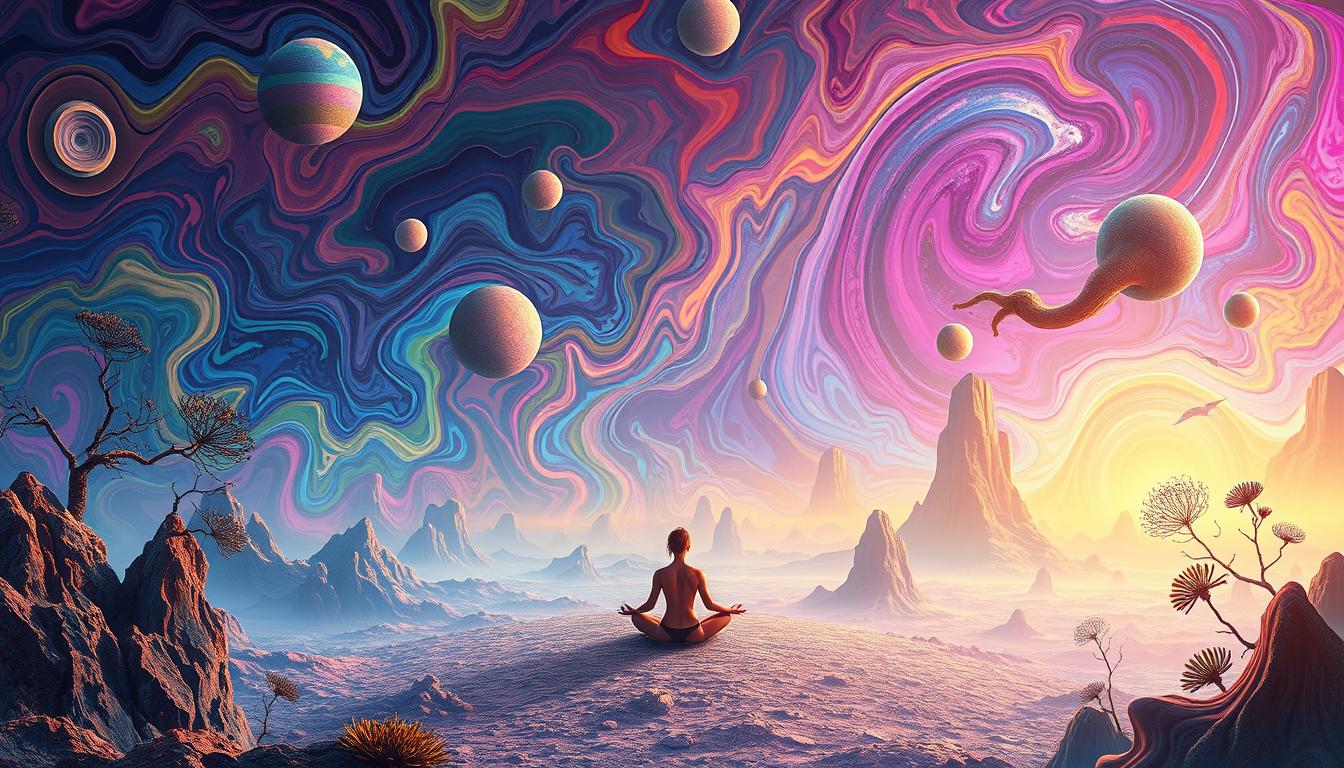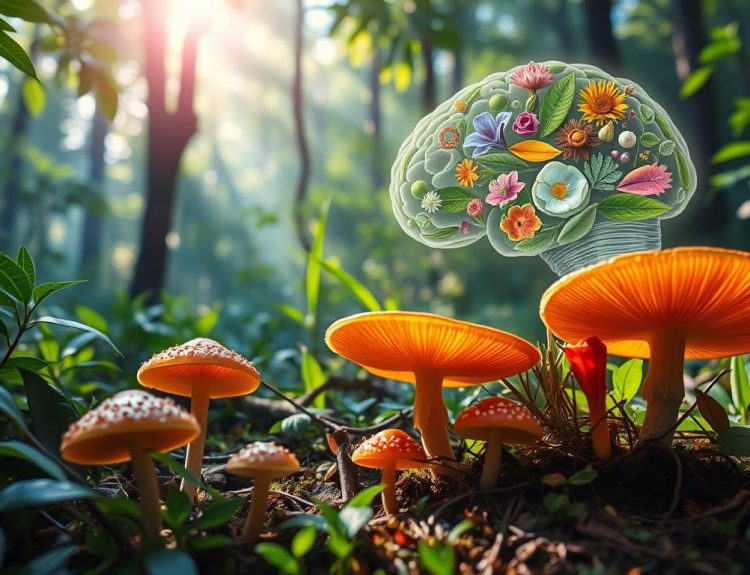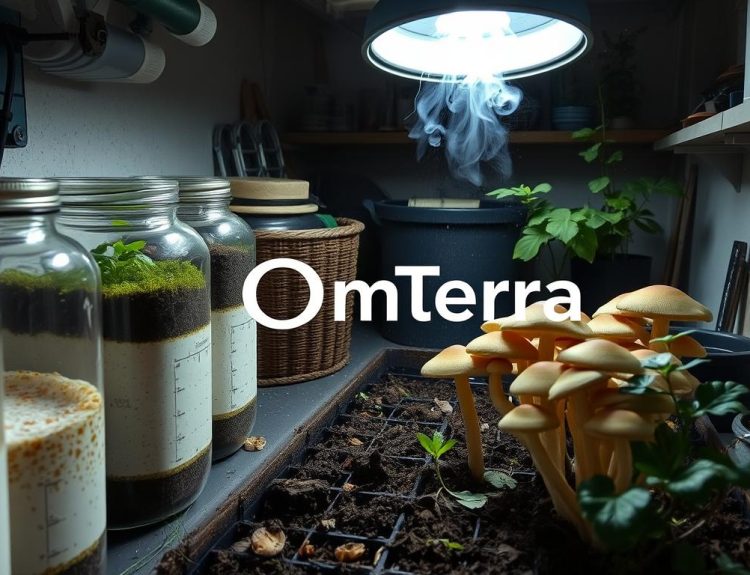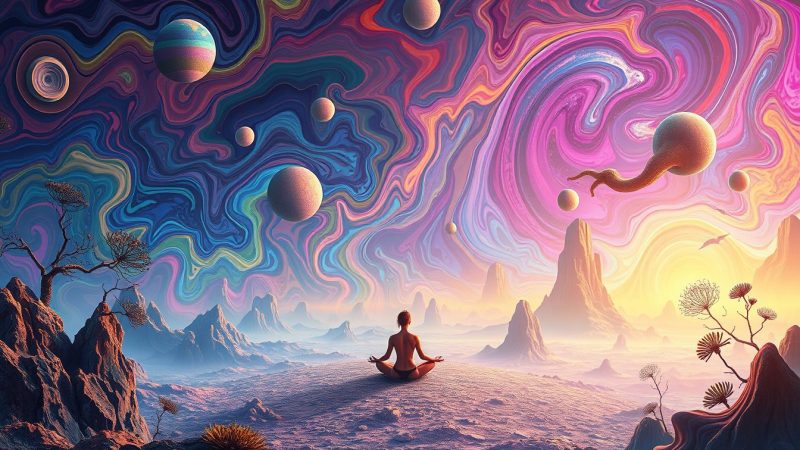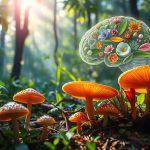Did you know that a single dose of psilocybin, the active compound in magic mushrooms, can significantly reduce symptoms of depression and anxiety for up to six months? This astounding fact is just one of the many remarkable discoveries emerging from the resurgence of psychedelic research. As someone who has personally experienced the profound healing power of psychedelics, I am excited to share with you the latest breakthroughs and clinical applications of these fascinating substances in mental health therapy.
In this article, we will embark on a journey to explore the transformative power of psychedelics such as psilocybin, LSD, ayahuasca, and MDMA in treating a range of mental health conditions, including depression, anxiety, PTSD, and trauma. We will dive into the historical context of psychedelics, their neurological effects, and the importance of set and setting in ensuring safe and effective therapeutic experiences. Along the way, we will also address important topics such as the legal status of psychedelics, current research efforts, and the challenges and opportunities that lie ahead in this promising field.
Key Takeaways
- Psychedelics show remarkable therapeutic promise for treating mental health conditions like depression, anxiety, and PTSD
- Recent breakthrough research has reignited interest in the clinical applications of psychedelics
- Proper set and setting, along with trained facilitators, are critical for safe and effective psychedelic experiences
- The legal status of psychedelics is evolving, with decriminalization efforts gaining traction in the United States
- Ongoing clinical trials and research are paving the way for the future of psychedelic medicine
The Resurgence of Psychedelic Research
In recent years, a renewed interest in psychedelic research has emerged, with scientists and medical professionals delving into their therapeutic benefits. This revival follows a period of prohibition and stigma, initiated in the late 1960s. The exploration of these substances marks a significant shift in the field.
Historical Context of Psychedelics
Psychedelics have a storied history, with ancient cultures employing them for spiritual and medicinal purposes. In the 1950s and 1960s, researchers began to investigate their therapeutic applications, focusing on LSD and psilocybin. Initial studies indicated promising results in treating mental health conditions such as depression, anxiety, and addiction.
The widespread recreational use of psychedelics during the 1960s counterculture movement, though, led to their prohibition. They were classified as Schedule I drugs in the United States, effectively halting research for decades.
Recent Breakthroughs in Psychedelic Studies
In the last two decades, a renewed interest in psychedelic research has materialized, with numerous studies examining their therapeutic potentials. Notable breakthroughs include:
- Psilocybin-assisted therapy for treatment-resistant depression and end-of-life anxiety
- MDMA-assisted psychotherapy for post-traumatic stress disorder (PTSD)
- LSD-assisted psychotherapy for anxiety associated with life-threatening illnesses
- Ayahuasca for the treatment of depression and addiction
These studies have yielded promising results, with participants experiencing significant mental health improvements. The FDA has granted “breakthrough therapy” status to some of these treatments, expediting their development and approval prospects.
| Psychedelic | Potential Therapeutic Applications |
|---|---|
| Psilocybin | Depression, anxiety, addiction, end-of-life distress |
| MDMA | PTSD, social anxiety |
| LSD | Anxiety associated with life-threatening illnesses, depression |
| Ayahuasca | Depression, addiction |
As research continues to uncover the benefits of psychedelics, it is imperative to approach their use with caution and under professional guidance. The resurgence of psychedelic research is exciting, but prioritizing safety and responsible use is critical to maximize their therapeutic benefits.
Understanding the Different Types of Psychedelics
In recent years, the therapeutic use of psychedelics has seen a resurgence of interest. These substances, once stigmatized and criminalized, are now being studied for their therapeutic benefits. They are being explored for treating mental health conditions such as depression, anxiety, PTSD, and addiction. Let’s examine some of the most well-known types of psychedelics.
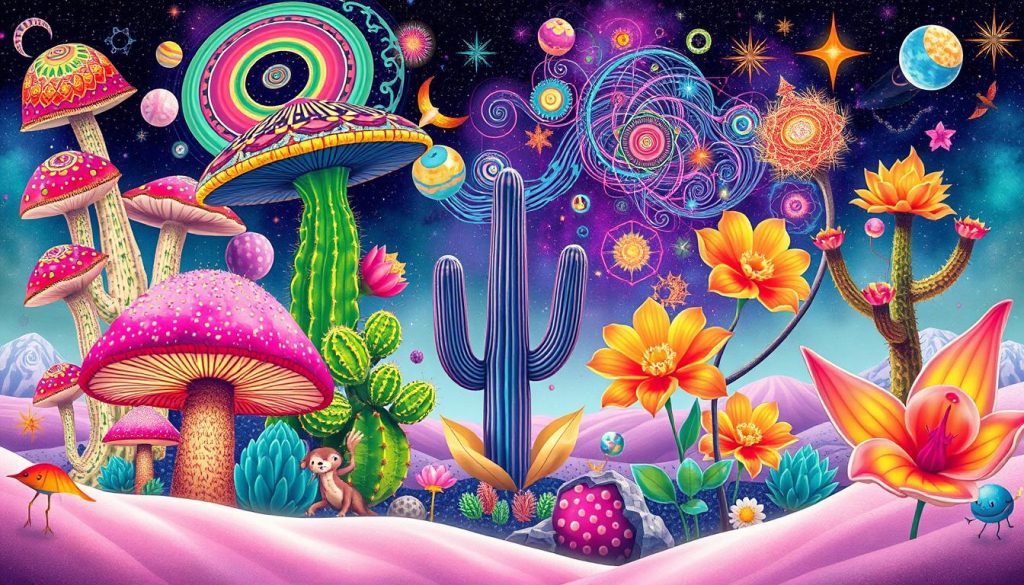
Psilocybin: The Magic Mushroom Compound
Psilocybin, the active compound in magic mushrooms, induces profound changes in perception, emotion, and consciousness. Recent studies have shown its rapid efficacy in reducing symptoms of depression and anxiety. This is even in patients who have not responded to traditional treatments.
LSD: Lysergic Acid Diethylamide
LSD, synthesized in 1938, is a potent psychedelic. It has been used in various therapeutic contexts, including treating alcoholism and end-of-life anxiety. LSD is renowned for its ability to induce profound spiritual experiences and insights.
DMT: The Spirit Molecule
DMT, a naturally occurring psychedelic compound, is found in many plants and animals. It is the active ingredient in ayahuasca, a traditional Amazonian brew. DMT is known for its ability to induce intense, short-lived psychedelic experiences.
MDMA: From Party Drug to Therapeutic Tool
MDMA, a synthetic psychedelic, has gained attention for its therapeutic use in treating PTSD. Unlike classic psychedelics like LSD and psilocybin, MDMA produces feelings of empathy, emotional openness, and interpersonal connection. This makes it well-suited for use in psychotherapy.
| Psychedelic | Source | Effects | Therapeutic Use |
|---|---|---|---|
| Psilocybin | Magic mushrooms | Changes in perception, emotion, and consciousness | Depression, anxiety |
| LSD | Synthetic | Profound spiritual experiences and insights | Alcoholism, end-of-life anxiety |
| DMT | Plants, animals, ayahuasca brew | Intense, short-lived psychedelic experiences | Spiritual and medicinal purposes |
| MDMA | Synthetic | Empathy, emotional openness, interpersonal connection | PTSD |
“Psychedelics, used responsibly and with proper caution, would be for psychiatry what the microscope is for biology and medicine or the telescope is for astronomy.” – Stanislav Grof, psychiatrist and researcher
As research continues to unveil the therapeutic benefits of these substances, it is essential to approach their use with caution and respect. Understanding the unique properties and effects of each type of psychedelic allows us to harness their power to heal and transform lives.
Psychedelics and Mental Health Treatment
The therapeutic efficacy of psychedelics for mental health conditions has recently garnered significant attention. Research continues to unveil the benefits of these compounds, positioning psychedelic-assisted therapy as a promising modality for treating depression, anxiety, PTSD, and addiction.
Psychedelic-Assisted Therapy for Depression and Anxiety
Psilocybin, the active compound in magic mushrooms, has demonstrated remarkable efficacy in treating depression and anxiety. A landmark study at Johns Hopkins University revealed that patients with treatment-resistant depression experienced significant improvement after just two doses of psilocybin combined with psychotherapy.
LSD has also shown promise in alleviating anxiety, with a particular focus on terminally ill patients. A study published in the Journal of Psychopharmacology found that LSD-assisted psychotherapy reduced anxiety and improved quality of life in patients with life-threatening diseases.
Treating PTSD with MDMA-Assisted Psychotherapy
MDMA, often associated with the party drug ecstasy, has shown remarkable promise in treating post-traumatic stress disorder (PTSD). MDMA-assisted psychotherapy involves administering the drug in a controlled therapeutic setting, allowing patients to process traumatic memories and experiences with reduced fear and anxiety.
“MDMA-assisted psychotherapy can help individuals with PTSD to revisit traumatic memories in a safe and supportive environment, facilitating emotional processing and healing.” – Dr. Michael Mithoefer, MAPS
The Multidisciplinary Association for Psychedelic Studies (MAPS) has conducted several clinical trials on MDMA-assisted psychotherapy for PTSD, with promising results. The FDA has granted breakthrough therapy designation to this treatment, accelerating its development and the possibility of approval.
Psychedelics and Addiction Treatment
Psychedelics, such as psilocybin and ayahuasca, are being explored as tools for treating addiction. These substances may help individuals break free from addictive patterns by providing profound insights and shifting perspectives.
A study published in the Journal of Psychopharmacology found that psilocybin-assisted therapy significantly reduced alcohol dependence in participants. Another study, published in Frontiers in Pharmacology, highlighted the therapeutic efficacy of ayahuasca in treating substance use disorders.
While the use of psychedelics in mental health treatment shows great promise, it is essential to approach these therapies with caution and under the guidance of trained professionals. As research continues to expand our understanding of these compounds, the future of psychedelic medicine looks increasingly bright.
The Neurological Effects of Psychedelics
Recent years have seen a resurgence of interest in psychedelics for their therapeutic applications in mental health, including depression, anxiety, and PTSD. The inquiry into their mechanisms of action within the brain is imperative, given their profound effects on consciousness and perception.
Studies indicate that psychedelics, such as psilocybin, LSD, and ayahuasca, interact with the brain’s serotonin system. This interaction enables them to bind to serotonin receptors, influencing neural activity and connectivity. Such alterations are responsible for the changes in perception, emotion, and cognition observed in individuals under their influence.
One significant neurological effect of psychedelics is their capacity to diminish activity in the default mode network (DMN). The DMN is a network of brain regions associated with self-referential thinking and rumination. Overactivity in this network has been linked to depression and other mental health conditions. By temporarily reducing DMN activity, psychedelics may facilitate a reset or rewiring of these dysfunctional patterns.
Psychedelics also enhance neuroplasticity, the brain’s ability to form new neural connections and adapt to new experiences. This increased plasticity is thought to contribute to the long-lasting therapeutic effects reported by many individuals following a single psychedelic session.
| Psychedelic | Primary Neurotransmitter Target | Therapeutic Potentials |
|---|---|---|
| Psilocybin | Serotonin (5-HT2A receptor) | Depression, anxiety, addiction |
| LSD | Serotonin (5-HT2A receptor) | Anxiety, depression, alcohol use disorder |
| Ayahuasca | Serotonin (5-HT2A receptor), MAO inhibition | Depression, addiction, PTSD |
| MDMA | Serotonin, dopamine, norepinephrine | PTSD, social anxiety |
The neurological effects of psychedelics hold significant promise, despite their classification as Schedule I drugs in the United States. This classification signifies a high abuse risk and lack of accepted medical use. Notably, the FDA has granted “breakthrough therapy” status to psilocybin and MDMA-assisted therapy, indicating a shift towards legal therapeutic applications.
As research progresses, the understanding of psychedelics’ mechanisms expands, fostering hope for their role in addressing mental health challenges. It is essential, though, that their use is strictly regulated, under the guidance of trained professionals, with careful consideration of set, setting, and safety.
Psychedelics and Spiritual Experiences
Psychedelics have long been associated with profound spiritual experiences, providing individuals with a unique pathway to explore the depths of their consciousness. These substances, such as psilocybin, ayahuasca, and LSD, can induce mystical states. These states are characterized by feelings of unity, transcendence, and a deep sense of meaning.

Recent research has shed light on the neurological mechanisms behind these spiritual experiences. It reveals how psychedelics can temporarily alter brain activity, leading to ego dissolution. This phenomenon involves a breakdown of the sense of self and a merging with the environment. It often results in a profound shift in perspective and a newfound appreciation for the interconnectedness of all things.
Ego Dissolution and Self-Transcendence
Ego dissolution is a key aspect of the spiritual experiences induced by psychedelics. When the ego temporarily dissolves, individuals often report a sense of self-transcendence. They feel a deep connection to the universe and a oneness with all of existence. This transformative experience can lead to lasting positive changes in attitudes, behaviors, and overall well-being.
Studies have shown that the intensity of ego dissolution correlates with the depth and significance of the spiritual experience. For example, a study published in the journal Frontiers in Psychology found that participants who experienced greater ego dissolution during a psilocybin session also reported more profound spiritual insights and positive long-term effects.
Psychedelics in Religious and Shamanic Practices
The use of psychedelics in religious and shamanic practices dates back centuries. Various cultures around the world have incorporated these substances into their spiritual rituals. From the indigenous peoples of the Amazon using ayahuasca to the ancient Aztecs consuming psilocybin mushrooms, psychedelics have played a significant role in facilitating direct experiences of the divine.
| Culture | Psychedelic Substance | Spiritual Purpose |
|---|---|---|
| Indigenous Amazonian | Ayahuasca | Healing, divination, spiritual growth |
| Mazatec (Mexico) | Psilocybin mushrooms | Communion with the divine, healing |
| Bwiti (Gabon) | Iboga | Initiation, spiritual insight, healing |
In modern times, the use of psychedelics in spiritual contexts has experienced a resurgence. The growth of neo-shamanic movements and the increasing interest in psychedelic-assisted therapy for mental health conditions have contributed to this trend. As research continues to validate the therapeutic and spiritual benefits of these substances, the line between spiritual practice and clinical treatment becomes increasingly blurred.
“Psychedelics, used responsibly and with proper caution, would be for psychiatry what the microscope is for biology and medicine or the telescope is for astronomy.” – Stanislav Grof, psychiatrist and researcher
As we continue to explore the relationship between psychedelics and spiritual experiences, it is essential to approach these powerful substances with respect, caution, and a deep understanding of their transformative power. This understanding is critical for harnessing their full therapeutic and spiritual benefits.
The Legal Status of Psychedelics
The legal status of psychedelics has been a contentious issue for decades. Most psychedelic substances remain illegal under federal law. Yet, recent legislative developments and decriminalization efforts are reshaping this landscape.
Currently, substances like psilocybin, LSD, and MDMA are classified as Schedule I drugs. This classification signifies a high abuse risk and no accepted medical use. As research reveals their therapeutic benefits, such as in treating depression, anxiety, and PTSD, the push for policy changes intensifies.
Current Legislation and Policies
Despite federal prohibition, states and cities are exploring decriminalization or legalization. In 2020, Oregon became the first state to legalize psilocybin for therapeutic use. The Oregon Psilocybin Services Act allows licensed facilitators to administer it in supervised settings. Cities like Denver, Oakland, and Santa Cruz have decriminalized certain psychedelics, focusing on public health and harm reduction over criminal penalties.
Decriminalization Efforts in the United States
The decriminalization movement has gained momentum, with advocates arguing that punitive policies have failed. They claim these policies have disproportionately harmed marginalized communities. Decriminalization efforts aim to treat drug use as a public health issue, reducing associated harms.
| State/City | Psychedelic Substance | Legal Status |
|---|---|---|
| Oregon | Psilocybin | Legalized for therapeutic use |
| Colorado | Psilocybin | Decriminalized possession |
| Denver, CO | Psilocybin | Decriminalized possession |
| Oakland, CA | Psilocybin, ayahuasca, ibogaine | Decriminalized possession and use |
| Santa Cruz, CA | Psilocybin, ayahuasca, ibogaine | Decriminalized possession and use |
As more states and cities consider decriminalization and legalization, prioritizing safety, education, and responsible use is essential. Shifting focus from criminalization to harm reduction and evidence-based policies can lead to a more compassionate and effective approach to psychedelics and mental health.
Safety Considerations and Responsible Use
Psychedelics, while promising in therapy, demand cautious and responsible handling. Their profound effects on the mind and body necessitate a focus on safety. This involves meticulous preparation, a supportive environment, and the expertise of trained professionals.
Set and Setting: The Importance of Context
The principles of “set and setting” are fundamental in the judicious use of psychedelics. Set pertains to the individual’s mindset, expectations, and intentions prior to the experience. Setting encompasses the physical and social milieu of the psychedelic session. A conducive, secure, and supportive setting is imperative for risk mitigation and therapeutic enhancement.
Optimal set and setting considerations include:
- A quiet, private space devoid of distractions
- Comfortable seating or lying areas
- Gentle lighting and soothing décor
- Access to restroom facilities and drinking water
- Presence of trained facilitators or therapists
The Role of Trained Facilitators and Therapists
Trained facilitators and therapists are indispensable for the safety and efficacy of psychedelic experiences. They are versed in the pharmacology, psychology, and risks associated with these substances. Their role involves guiding, supporting, and intervening as needed during the session.
| Facilitator/Therapist Responsibilities | Importance |
|---|---|
| Screening participants | Ensures suitability and minimizes risks |
| Preparing participants | Sets expectations and intentions |
| Monitoring the session | Provides safety and support |
| Facilitating integration | Helps incorporate insights into daily life |
“The presence of a trained facilitator or therapist is essential for navigating the profound experiences that can arise during psychedelic sessions. They provide a sense of safety, guide the process, and help integrate the insights gained.”
By focusing on safety and responsible use, the therapeutic benefits of psychedelics can be maximized while reducing risks. Attention to set and setting, coupled with professional guidance, lays the groundwork for transformative and healing experiences.
The Future of Psychedelic Medicine
The therapeutic landscape of psychedelics is evolving, promising a future where these substances play a significant role in medicine. Researchers and scientists are dedicated to exploring new applications and refining existing treatments. Their efforts aim to unlock the full therapeutic capacity of these extraordinary compounds.
The resurgence of psychedelic research has unveiled a multitude of possibilities. Clinical trials are underway to assess their efficacy in treating various mental health conditions. These include depression, anxiety, PTSD, and addiction. The goal is to establish a scientific foundation for psychedelic therapy’s integration into mainstream healthcare.
Ongoing Clinical Trials and Research
Research institutions and pharmaceutical companies are heavily investing in psychedelic medicine development. Notable ongoing clinical trials include:
- Psilocybin-assisted therapy for treatment-resistant depression
- MDMA-assisted psychotherapy for PTSD
- LSD-assisted psychotherapy for anxiety associated with life-threatening illnesses
- Ayahuasca for the treatment of addiction and depression
These trials are meticulously designed to ensure the safety and efficacy of psychedelic treatments. As positive outcomes are reported, the scientific community and regulatory bodies increasingly support further research and approval of psychedelic medicines.
Potential Applications and Challenges
Psychedelics hold promise beyond mental health treatment. They are being explored for their ability to enhance creativity, problem-solving, and personal growth. The mystical and spiritual experiences associated with psychedelics are also being studied for their well-being and self-transcendence benefits.
Yet, the journey to widespread acceptance of psychedelic medicine is fraught with challenges. Legal and regulatory hurdles, stigma, and the need for proper education and training of healthcare professionals are significant obstacles. Ensuring the safe and responsible use of psychedelics is critical, necessitating the development of standardized protocols and guidelines.
Collaboration between researchers, policymakers, and the public will be vital in shaping the future of psychedelic medicine. Continued research, open dialogue, and a compassionate approach are essential. Together, we can harness the full therapeutic power of psychedelics, revolutionizing mental health and well-being.
Conclusion
In our examination of psychedelics, we’ve traversed their historical backdrop, recent scientific advancements, varied forms, and their therapeutic possibilities. From psilocybin and LSD to ayahuasca and MDMA, these substances hold promise in addressing mental health issues such as depression, anxiety, PTSD, and addiction. The ongoing clinical trials and studies are essential in understanding their neurological effects and therapeutic benefits. It is imperative to approach their use with caution, responsibility, and compassionate guidance.
Personally, my journey with psychedelics has been transformative. Through guided experiences in safe environments, I’ve confronted deep-seated traumas and gained profound insights into my psyche. The therapeutic power of psychedelics, when used responsibly and with proper support, can catalyze remarkable growth and self-discovery. Acknowledging the risks and legal considerations surrounding these substances is vital, highlighting the necessity of trained facilitators and therapists in navigating these experiences.
As we stand at the threshold of a new era in psychedelic medicine, our collective responsibility is to approach these tools with reverence, humility, and a commitment to harm reduction. By prioritizing safety, education, and compassionate guidance, we can unlock the vast therapeutic power of psychedelics. Whether you are a seasoned psychonaut or simply curious, remember that every personal healing journey is unique. With an open mind and a supportive community, psychedelics can guide us toward greater well-being, self-understanding, and connection to the world around us.
FAQ
What are psychedelics, and how can they be used therapeutically?
Are psychedelics safe for therapeutic use?
What is the current legal status of psychedelics?
How can I find a reputable psychedelic therapist or retreat?
Can psychedelics help with treatment-resistant depression or anxiety?
What role does set and setting play in psychedelic therapy?

